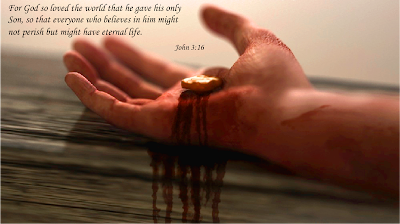THE LORD'S PASSION OR THE ‘CONSUMMATUM EST’ OF LOVE.
April 2, 2021
Good Friday of the Lord’s Passion - B.
Readings: Is 52:13—53:12; Ps 31:2, 6, 12-13, 15-16, 17, 25; Heb 4:14-16; 5:7-9; Jn 18:1—19:42.
A French proverb says, “It is loving too much to die of
love.” And a Congolese proverb adds, “Lovers do not hide their nakedness to
each other.”
For our Lord Jesus, the real Passover takes place not at the
table with a sacrificial lamb, the bread, and the wine but at the Cross, in the
Passion. His Passover that we celebrated last night is perpetrated in his
passion that we live today.
On this day, when "Christ our paschal lamb was
sacrificed" (1 Cor 5:7), what had long been promised in signs and figurative
was at last revealed and all the ancient prophecies were brought to their
fulfillment. In the Lord Jesus dying on the Wood of the Cross, the true Lamb
replaces the symbolic lamb, and the many offerings of Ancient Israel give way
to the unique sacrifice that truly pleases God, the sacrifice of love.
The Catechism of the Catholic Church says, “It is love
"to the end" that confers on Christ's sacrifice its value as
redemption and reparation, as atonement and satisfaction. He knew and loved us
all when he offered his life. Now "the love of Christ controls us, because
we are convinced that one has died for all; therefore, all have died." No
man, not even the holiest, was ever able to take on himself the sins of all men
and offer himself as a sacrifice for all. The existence in Christ of the divine
person of the Son, who at once surpasses and embraces all human persons, and
constitutes himself as the Head of all mankind, makes possible his redemptive
sacrifice for all.” CCC. 616.
The liturgy of today has something unique: no entrance
antiphon or song, no flowers, no revetement on the altar. It is the quietest
celebration of the liturgical year, and to say it better, the most sorrowful.
We lament not so much the death of the Lord but our sins, the cause of that
death. We made a process to the Son of God for what we ourselves willfully
committed. God is brought to pay the price for human failures.
Meditating on the word of God given to us today, and putting
them in our context, we realize that what took place two thousand years ago is
still happening even today. Innocent people are made to pay for the faults of
others. And the Passion of Christ continues.
Jesus suffers today in the child who is brought victim of
sexual predators and abusers. Jesus suffers in those whom our systems reduce to
perpetual poverty and misery. Jesus suffers in those innocently accused while
true shamefaced move around freely. Jesus suffers injustice, rejections,
indifference, lack of love, and the so many plagues of our world. Jesus
silently suffers all that is going on in today's world, and as a lonely
cavalier, he undergoes his continued passions. All this, for a unique reason,
his love, God’s passionate love for mankind.
What we celebrate today is the greatest love of God. May it
open us to be ourselves passionate about God and of our neighbors. With Jesus,
let us take our part of the daily crosses of our brothers, and spread love
wherever the world serves hatred and egoism, injustice and narcissism,
indifference and greed. For, the only remedy to our today’s sufferings is
nothing else but genuine love which can put first the interests of others
before our own selfish interests.





Comments
Post a Comment